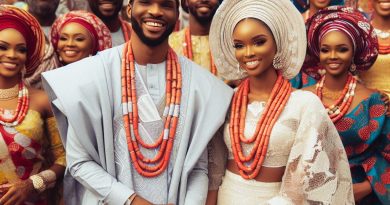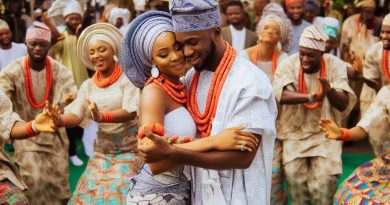Bible Teachings: The Foundation of Marriage in Nigeria
Last Updated on October 17, 2023
Introduction
In Nigeria, marriage is a sacred institution, deeply rooted in cultural and religious traditions.
Understanding the foundation of marriage is crucial for couples, families, and communities.
This blog post delves into the profound teachings of the Bible, shaping marital bonds in Nigeria.
By exploring these teachings, we unravel the essence of love, commitment, and mutual respect in Nigerian marriages.
Join us on this enlightening journey, where we examine timeless wisdom and its application in the modern context.
Embracing the rich tapestry of biblical guidance, we unveil the secrets to enduring and blissful marriages in Nigeria.
Let’s navigate the spiritual insights that underpin the foundation of every successful marriage, bringing harmony and fulfillment to couples across the nation.
The Role of Religion in Nigerian Society
Religion, primarily Christianity and Islam, significantly influences Nigerian society, particularly in the context of marriage.
Christianity, practiced by the majority, highlights marriage’s sanctity, lifelong commitment, and guidance from the Bible.
Christian principles emphasize love, respect, and specific roles for husbands and wives within marriage.
Islam, followed by a significant minority, emphasizes mutual love, understanding, cooperation, and guidance from the Quran.
Religious leaders counsel couples on open communication, forgiveness, and family values.
Religious ceremonies, including weddings, incorporate traditional customs, religious rites, and blessings by leaders.
Religion shapes viewpoints on divorce, with Christianity discouraging it except in cases of adultery or abuse and Islam allowing it under specific Quranic conditions.
Christian and Islamic teachings have deeply influenced marriage practices, serving as a common foundation for Nigerians.
These religious principles guide couples in building and maintaining strong, committed marriages.
Religious faith supports Nigerians in navigating marital complexities and seeking solace during challenges.
Religion remains a firm cornerstone of marriage in Nigeria, shaping beliefs, practices, and cultural norms.
The Bible’s teachings provide a unifying foundation for Nigerian couples, strengthening marital bonds and unity.
Read: Nigerian Interfaith Marriages: Triumphs and Trials
Bible Teachings on the Purpose of Marriage
The Bible teaches three main purposes of marriage: companionship, procreation, and mutual support.
Genesis 2:18 highlights the need for companionship and sharing life’s joys and burdens.
Genesis 1:28 emphasizes the responsibility of procreation and raising children.
Ephesians 5:25 instructs spouses to love and support each other sacrificially.
Nigerian couples value companionship, understanding the importance of being there for each other.
Procreation is deeply ingrained in Nigerian culture, seen as a duty to build a family legacy.
Mutual support is highly emphasized, with partners sharing responsibilities, offering emotional support, and making sacrifices.
Relevant Bible verses serve as a foundation for Nigerian couples’ understanding and application of these teachings.
Read: Arranged Marriages in Nigeria: Myth vs. Reality
Bible Teachings on the Roles of Husband and Wife
Traditional Gender Roles in Nigerian Marriages
- The husband is considered the head of the family.
- The wife is expected to be submissive to her husband.
Biblical Passages Supporting these Roles
- Ephesians 5:22-24 – “Wives, submit to your own husbands as to the Lord.”
- 1 Peter 3:1 – “Wives, in the same way submit yourselves to your own husbands.”
Evolving Perceptions of Gender Roles in Modern Nigerian Society
Over time, Nigerian society has witnessed changes in gender roles, challenging traditional teachings:
- Women empowerment movements advocate for equal rights and opportunities for both genders.
- Nigerian women are actively pursuing education and careers, shifting the traditional dynamics.
- With modernization and exposure to Western ideologies, some couples embrace more egalitarian roles.
Despite these changes, many Nigerian couples still adhere to traditional gender roles:
- Some men assume the role of the head of the family, making major decisions.
- Wives continue to prioritize their husband’s needs and maintain a submissive attitude.
However, there are instances where these traditional teachings are challenged and adapted:
- Biblical interpretations have evolved to emphasize love, respect, and mutual submission in marriage.
- Some Nigerian couples strive for egalitarian marriages where responsibilities are shared equally.
It is important to note that these changing perceptions of gender roles vary among individuals and communities:
- Rural areas may still strongly adhere to traditional gender roles due to cultural and religious influences.
- In urban settings, couples may adapt their roles to fit modern lifestyles and societal expectations.
In a nutshell, while traditional Nigerian marriages follow the biblical teachings of the husband as the head of the family and the wife as a submissive partner, modern society’s evolving perceptions of gender roles challenge and adapt these teachings.
The balance between tradition and progress lies in the hands of each individual couple as they interpret and apply biblical teachings to their own marriage.
Read: Trends in Nigerian Weddings: From Tradition to Modernity

Bible Teachings on Love and Commitment
The Bible defines love as selflessness, transcending mere emotions, and promoting sacrificial actions and caring for others.
Key passages, such as 1 Corinthians 13:4-7, stress selflessness, kindness, and patience, essential in marital love.
Ephesians 5:25 and 1 Peter 3:7 underscore a husband’s sacrificial love and mutual respect within the marriage covenant.
These biblical teachings greatly influence the Nigerian cultural expectation of loyalty in marriages.
Nigerian marriages prioritize fidelity and commitment, viewing infidelity as a breach of trust and cultural taboo.
The concept of forgiveness is also influenced by the Bible, promoting reconciliation and restoration in relationships.
The Bible’s teachings serve as a strong foundation for Nigerian marriages, reinforcing the choice of love, forgiveness, and loyalty.
Read: Marriage Traditions in the Old Testament: What We Learn
Challenges and Controversies Surrounding Biblical Teachings
Acknowledge that not all Nigerians align their marriages with strict biblical teachings.
Discuss the complexities and conflicts that arise when biblical teachings clash with cultural practices or individual desires.
Highlight some of the contemporary debates around marriage in Nigeria, such as divorce and gender equality.
Misalignment with Biblical Teachings
In Nigeria, despite the prevalence of Christianity, not all marriages adhere strictly to biblical teachings.
Some couples choose to incorporate cultural practices or prioritize personal desires over biblical guidelines.
This misalignment with biblical teachings can lead to conflicts and challenges within marriages.
Clash of Biblical Teachings with Cultural Practices
Nigeria is a country with diverse cultural practices that can clash with strict biblical teachings on marriage.
For example, in some cultures, polygamy is accepted, whereas biblical teachings advocate for monogamy.
These conflicts can create tension between couples, family members, and even entire communities.
Individual Desires versus Biblical Teachings
Individual desires and preferences often take precedence over strict biblical teachings in Nigerian marriages.
Many couples prioritize their happiness, fulfillment, and personal growth over conforming to biblical guidelines.
This can lead to challenges and controversies within marriages, as couples navigate their own paths.
Contemporary Debates: Divorce
Divorce is a prominent contemporary debate surrounding marriage in Nigeria.
Biblical teachings on marriage generally discourage divorce, emphasizing the permanency of the marital bond.
However, societal changes, evolving values, and individual rights have led to an increase in divorce rates.
This has raised debates within religious communities and among individuals who struggle to balance biblical teachings with personal circumstances.
Contemporary Debates: Gender Equality
Gender equality is another contentious topic surrounding biblical teachings and marriage in Nigeria.
Biblical teachings often emphasize male leadership and submission of women in marriage.
However, the global movement for gender equality has influenced Nigerian society, challenging traditional gender roles.
This has sparked debates about the interpretation of biblical teachings and the role of women within marriages.
The foundation of marriage in Nigeria is rooted in biblical teachings, but challenges and controversies are prevalent.
Not all Nigerians align their marriages with strict biblical guidelines, leading to conflicts and complexities.
Clashes with cultural practices and individual desires, as well as debates on divorce and gender equality, further contribute to the challenges surrounding biblical teachings in Nigerian marriages.
In navigating these challenges, couples and individuals must find a balance between their faith, culture, and personal needs to create thriving and harmonious marriages.
Conclusion
This blog post has highlighted the significance of Bible teachings as the foundation of marriage in Nigeria.
We have discussed how these teachings have played a vital role in shaping marital relationships and promoting long-lasting unions.
The enduring influence of these teachings cannot be overstated, as they continue to guide couples in their journey of love and commitment.
As readers, it is essential for us to reflect on our own beliefs and interpretations of these teachings in relation to our own marriages, ensuring that they align with our values and principles.
By embracing these teachings and incorporating them into our daily lives, we can strive for stronger and more fulfilling marriages.


